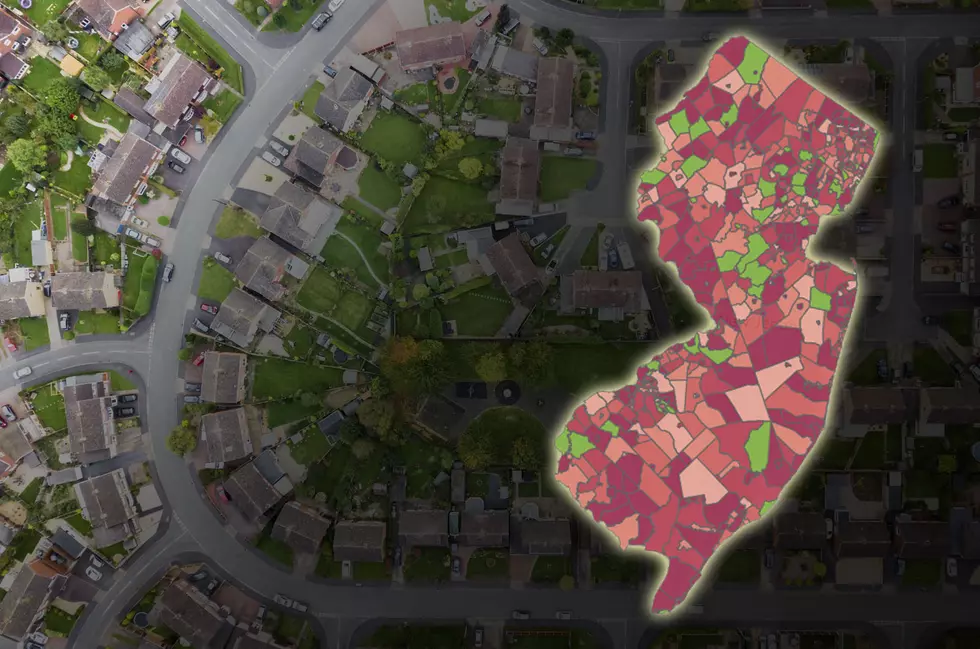
Average NJ property tax bill now $9,111 — How your town compares
TRENTON — Property taxes went up by $158 for the average New Jersey homeowner last year, according to figures compiled by New Jersey 101.5. The total jump in the tax levy was the most in 10 years.
The average residential property tax bill in 2020 was $9,111, an increase of 1.8%, according to the unofficial data. The state Department of Community Affairs hasn’t released its annual report yet; last year, it was published in early March.
Though the bill is increasing, the yearly statewide change looks good, said Marc Pfeiffer, assistant director of Rutgers University’s Bloustein Local Government Research Center. The increase is less than 2% and has been less than or equal to the increase in the state’s assessed taxable value for the last four years.
(Scroll down to see how your town compares.)
Can taxes stay flat?
“An expectation for property taxes to remain flat from year-to-year, the only way that really happens is either the government agency either reduced their cost in some way or they have new construction that adds value and they’re collecting added revenues from those parcels to cover the increase in cost,” Pfeiffer said.
“There’s always going to be increase in cost, if only due to labor costs,” he said. “If you’ve got a police department, police contracts are always going to go up. If you have other employees, there’s always going to be cost of living wages, things like that that have become part of the practice of how government agencies work, both at the county, school and municipal level.”
The total tax levy was nearly $31.2 billion, including $16.3 billion for school districts, $9.1 billion for municipal government, $5.5 billion for county government and $340 million levied by special taxing entities for things such as fire, garbage collection and business improvement districts.
The total increase, including the $13.4 million more for special taxing districts that aren’t generally included in the official tabulation, was $737 million – up from $665 million in 2019 and the most since property taxes went up $962 million in 2010, after state aid was cut during the Great Recession and just before the 2% levy cap was approved.
The tax levy rose by 2.4%, the third straight year when the increase was bigger than the year before. It has exceeded the 2% levy cap, which includes exceptions for things such as pensions, health benefits, debt, construction and emergencies and allowances for ratable growth, in five of the last seven years.
Increases in the tax base meant the state’s overall general tax rate fell slightly, as it has in three of the last four years. Those increases included major property revaluations in Bayonne, Harrison, South River, Hawthorne, Fanwood and Garwood, as well as more modest changes in other places.
The assessed value of the average home increased by an average of 2.3%, reaching $330,578. The higher values and lower tax rate work out to a 1.8% average tax increase from last year’s average of $8,953.
Pfeiffer said gradual increases in ratables are the best circumstances, so long as the new warehouse or housing complex doesn’t increase the cost of delivering services.
“That’s the best of all possible worlds. That gives local leaders the opportunity to talk to their labor unions about keeping costs in line,” he said. “And then managing their cost: If there’s an increase in expenses in one area, maybe we can look at how we can save money there. That leads to the discussion of potential shared services with a neighboring municipality, another school district or their county government. That’s always important.”
$10,000 tax bill
The average residential property tax bill now tops $10,000 in 191 of 565 municipalities in New Jersey, 17 more than a year ago. Taxes rose more than 5% on the average home in 32 municipalities. The average bill shrank in nearly one in 10 municipalities, including seven where it fell more than 3%.
“New Jersey is full of paradoxes. So, for example, yes, a lot of people complain about property taxes being the highest in the country, and, yes, they certainly are,” Pfeiffer saids. “On the other hand, when you look at Monmouth University polling’s annual survey of quality of life in New Jersey, people are very satisfied with their local government in the 60, 70% range. They’re just as satisfied with their schools, for the most part. So, where you do have high taxes, you’re also getting a high level of satisfaction.”
How the bill is split
School taxes accounted for more than half of the increase in the tax levy, as has been the case for seven consecutive years now – up $377 million, or 2.4%.
Municipal taxes increased at their highest rate since 2011 – $258 million, or 2.9%, not counting an additional 4.1% increase for the special taxing districts that provide some typically municipal services.
County taxes were up 1.6%, almost $89 million.
Pfeiffer said the increase in municipal taxes could be related to the elimination of the 2% cap on arbitration settlements of police and fire contracts.
COMPARE: Highest 2020 property taxes in each county
If map does not display correctly, click here to view on another page.
Michael Symons is State House bureau chief for New Jersey 101.5. Contact him at michael.symons@townsquaremedia.com.
More From Cat Country 107.3










